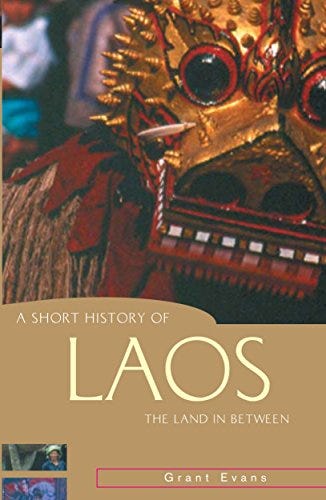How best to answer that question than talking to a reference? Someone who has studied Lao history, who spent years combing documents trying to make sense of events; someone who reads and writes not only Lao and Thai but Pali, the old language initiated in India from which we derived contemporary Lao. Ryan Wolfson Ford is such a person.
He is a specialist of Southeast Asia History, has a PhD degree from Wisconsin-Madison University, was a lecturer in Asian History at the Arizona State University and is currently the reference librarian for Lao and Thai studies at the Library of Congress, Washington DC. Ryan is also a board member of the Center for Lao Studies, an "unique organization that serves both as an academic and a resource center for scholars, the general public, and persons of Lao heritage around the world"1. His research interests include the Lao elite, palm leaf manuscripts, and intellectual, cultural and political history2. Above all, Ryan is a good friend of Laos, he enjoys being surrounded by Lao people, appreciating our food and our conversations.
What transpires of the discussion is not so much identifying the top three books to read but the humility of being an historian, the hard work of combing through documents, trying to make sense of events, the gaps in information, the lack of first hand accounts coming from the Lao people themselves, from those who were at the frontline. Ryan helps us uncover the world of academics: the scholars' journals, the online resources, the problematic accounts from French, US archives.
I address the wokeness of some of my compatriots: "should I read a history book written by foreigners?" - a question that made me wonder if - as with farang historians - they speak and read Lao or Pali?
If you live in the US, you can meet Ryan at the Library of Congress, Asian reading room. Getting registered is easy, you only need your ID and show up ! https://www.loc.gov/rr/readerregistration.html
Also note that if you are a researcher and live overseas, there are annual scholarship you can apply for.
The books mentioned in the conversation are:
Silā Vīravong & Khana Kammakān Vithanyāsāt Sangkhom (Laos). (1990). Mahā silā vīravong : sīvit læ phonngān (Phim khang thī 1). Khana Kammakān Vithayāsāt Sangkhom.
Silā Vīravong & Hō̜samut hǣng Sāt (Laos). (2001). Pavatsāt lāo : tǣ būhān thœ̄ng 1946 (Phim khang thī 3). Hō̜samut hǣng Sāt.
Silā Vīravong United States. History of Laos. New York: Paragon Book Reprint Corp; 1964.
Evans, G., & Osborne, M. (2003). A Short History of Laos: The Land in Between (A Short History of Asia series). Allen & Unwin.
Evans G. Lao Peasants Under Socialism. New Haven: Yale University Press; 1990.
Stuart-Fox M. The Lao Kingdom of Lan Xang : Rise and Decline. Bangkok Thailand: White Lotus Press; 1998.
Digital Librairies
https://www.worldcat.org/search?q=laos
National archives:
French: https://gallica.bnf.fr/accueil/en/content/accueil-en
US: https://eresources.loc.gov/ and https://www.archives.gov/
United Kingdom: https://www.nationalarchives.gov.uk/
Happy reading!
The Center for Lao Studies was founded by Vinya Sysamouth and John Hartman with the mission to advance knowledge and engagement in the field of Lao Studies through research, education and information sharing. More here: https://www.laostudies.org/
You can find some of Ryan's publications here: https://loc.academia.edu/RyanWolfsonFord








Share this post